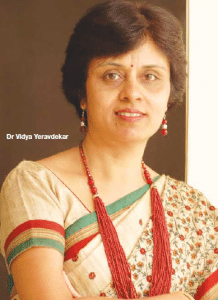 Symbiosis’ journey with education spans over four decades. With an ambition of spreading its name internationally, the Symbiosis International University is now working towards strengthening innovation and research. Dr Vidya Yeravdekar, the Principal Director of Symbiosis Society, in conversation with Chhavi Bakaria. Excerpts:
Symbiosis’ journey with education spans over four decades. With an ambition of spreading its name internationally, the Symbiosis International University is now working towards strengthening innovation and research. Dr Vidya Yeravdekar, the Principal Director of Symbiosis Society, in conversation with Chhavi Bakaria. Excerpts:
Please share with us the vision behind Symbiosis International University.
The organisation called Symbiosis,which is a not-for-profit organisation,was established by Dr Shantaram Balwant Majumdar in 1971 with the objective of helping foreign students who came to study in India. We have come a long way since then and now we are a group of about 43 institutions that were initially affiliated to Pune University.In 2002, we got the deemed university status and became the Symbiosis International University. It was like getting wings to fly. We cater to over 30,000 students from 81 different countries and also from all over India.We have a strategy towards internationalisation,capacity building and offering programmes that are innovative with a thrust to improve employability, which is a major issue in India.
 On India-US Higher Education Dialogue 2013 On India-US Higher Education Dialogue 2013The India-US Higher Education Dialogue was excellent. We have learnt a lot from it especially on community colleges.We do have a couple of community colleges, but the policy makers will instituionalise this whole community colleges concept in India. Use of ICT in education through the MOOCs (Massive Open Online Course) and similar platforms, this is something new to us  Employability Challenges Employability ChallengesOur alumni are on the board of management because we think it is important to get their inputs about the way curriculum should beshaped |
How important are private universities in the Indian context and how have they contributed to education?
The private players have played an important role in the expansion of higher education in India. I think quality and excellence have to be the focus rather than the debate about public or private institutions. The Indianvgovernment should look at making accreditation compulsory for almost all institutions. Also, there are foreign institutions and universities that are looking to collaborate with Indian Universities,and I think barring the IITs and IIMs, they find it very easy collaborating with private universities. Thus,private universities are in the forefront of joint programmes and foreign university collaborations, bringing foreign students to India and in the whole process of internationalisation, which has still not happened at the public university set up. In addition, the competition between public and private can actually bring about quality and excellence.
How do you address the challenge of increasing employability of your students?
We work very closely with industry partners and we have them on our board of studies and on our academic council as well. Our alumni are also on the board of management because we think it is important to get their inputs about the way curriculum should be shaped. Being a deemed university there is an advantage of flexibility. The University alumni that are now well placed in the companies do come back and recruit students in their companies. We also work very closely with industry bodies like CII, FICCI, and ASSOCHAM.
Why Indian Universities, both private and public, lag behind in international rankings?
I think the major lacuna here obviously is the huge population that you are trying to cater to. Indian policy makers really are looking at expansion and quality at the same time. It should be left to the institutions to actually look at quality and excellence. Also, finding quality faculty is a big hurdle.Earlier, the faculty scales were pretty low and teaching was the last career option. Now faculty salaries have risen up and we are seeing a lot of industry people wanting to come and teach, so faculty quality will definitely improve over time.
Another important thing is research.Even though we are known for our IT expanse and contribution to IT,but we have always been service providers,we have never been innovators. So I think innovation and research together is lacking. One of the main reasons behind that is the dearth of government’s funding for research. Also, private institutions are not treated as equal players when we come up with a research proposal.
Moreover, a lot of research organisations should be located on university campuses. Take the example of Pune, if the National Chemical Laboratory was part of the Pune University’s chemistry department, probably innovations would have occurred. Even ideally the R&D centres of companies should be on university campuses. This is where it differs from American Universities. At Standford University there is a technology park dedicated to research and innovation.
Please share with us various foreign collaborations and future plans of your University.
We are a part of the Erasmus Mundus Consortium of the European Universities and thus we have collaborations with a lot of French and German Universities.We have also partnered with some of the top universities in Asia like the Nanyang Technological University,
Singapore. We have a lot of tie ups with American Universities, but now we are also looking at developing new programmes
like Scholar Residence where foreign faculty can come and stay at our campus, be part of our faculty group and help develop joint research.
We have earmarked about 80 acres where we will have our engineering school. We are also planning to set-up a medical school, a hospital and some paramedical and nursing programmes in the area, which we are going to designate as the technology park. We have set up an IPR (Intellectual Property Right) cell along with an incubation centre. If our alumni have a good idea and they want to come out with a new product,we will give them the space and resources.For this we are developing small incubation centres, and hopefully we will develop a technology park in years to come.
| University academicians voice opinions and share their vision for private higher education in India, in conversation with Chhavi Bakaria |
 Prof P P Mathur,
Prof P P Mathur,
Vice Chancellor, KIIT
University
Upping Employability
Increasing employability of our students,especially the engineering graduates is top on our agenda. This year we have introduced skill-based learning courses so that the students become much more skilled. We provide a lot of flexibility to the companies to take up company-oriented training.These courses help our students as well as the faculty, for instance we have ‘Train the Trainers’ programme with Accenture in which they coach our teachers on how to train students in different programming languages that they would like to learn. Thus,we train our students to be day-one ready for employment.
 Dr Upinder Dhar,
Dr Upinder Dhar,
Founding Vice Chancellor, JK Lakshmipat University
Higher Education should be Genuinely Priced
Two years back we started with only two streams of technical education: management and engineering. We don’t want to become a mass or me-too kind of university. We want to concentrate on a niche area that will enable people to get employed and also focus on research so that new knowledge can be generated. Ours is a corporate backed university with a CSR (Corporate Social Responsibility) motive in mind and that helps us in increasing industry interactions. I think,genuine pricing should be allowed in higher education as quality comes at a cost. For example, even in IIMs students pay hefty fees for quality education. However, profiteering should not be permitted in education.Prof P P Mathur,Vice Chancellor, KIIT University Dr Upinder Dhar, Founding Vice Chancellor, JK Lakshmipat University private university special University academicians voice opinions and share their vision for private higher education in India, in conversation with Chhavi Bakaria
 Nikhil Sinha,
Nikhil Sinha,
Vice Chancellor, Shiv Nadar university
Focus on Knowledge Creation rather than Dissemination
The University’s mission is to develop students with the breadth of vision, knowledge, skills and attitudes needed to shoulder the globally responsible and ethical leadership burdens of the 21st Century and beyond. With our academic partnerships with Babson, USA, we aim to create India’s first entrepreneurship focused centre and business programme. There is also a tie-up with Duke TIP for establishing a Center for Gifted Children and promoting research in the field of education. Also, behind the strong emphasis on inter-disciplinary research at SNU, the idea is to seamlessly connect all the schools to enable interaction across disciplines and actively engage faculty and students to constantly create knowledge rather than just disseminate it.
 Prashant Bhalla
Prashant Bhalla
Senior Vice President, Manav Rachna International University
Autonomy is the Need of the Hour
Though we have come a long way in terms of privatisation of the education sector, but we need to improve upon areas like giving autonomy to higher education, liberal support for research and development, progressive and forward looking laws based upon self-regulation for private universities to prosper. We need to ensure that brilliant minds stay in the country rather than looking for opportunities abroad. At Manav Rachna, we have a highly qualified teaching faculty, state-of-the-art infrastructure, industry-oriented courses, foreign collaboration, to boost academic tie-ups and research. We also want to promote extra-curricular activities like sports, as there is a pool of talent available, but remains underutilised due to lack of proper coaching and infrastructure.




















